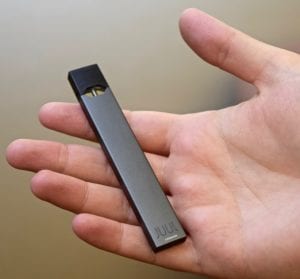Who is a member?
Our members are the local governments of Massachusetts and their elected and appointed leadership.

A Juul brand e-cigarette
The first phase of a new state tobacco control law, which went into effect in late November, dramatically increases fines for violations by retailers.
Under the new law, general tobacco retailers and adult-only tobacco stores can sell only tobacco-flavored or unflavored e-cigarettes and vape products (including CBD vaping products). Adult-only tobacco stores, such as vape shops, are permitted to sell vape products with higher nicotine levels. Department of Revenue-approved smoking bars may sell flavored products, but only for on-site consumption.
The long-standing graduated fine schedule of $100, $200 and $300 for selling tobacco products to minors has been replaced by a mandated penalty of $1,000, $2,000 and $5,000. (The first offense would be the lowest fine; subsequent offenses within a three-year period would trigger the higher fines.) These fines apply to illegal sales to minors, violations of the flavored product restrictions, and a handful of other state law restrictions regarding the sale of tobacco and vaping products.
No local action is required to issue the higher fines. Municipalities are advised to notify local tobacco sales permit holders of this change before issuing the higher fines. The fines will continue to be paid into the local municipality’s general fund unless the community has a revolving fund established for tobacco violations.
Cities and towns are encouraged to include the new, mandated state fine schedule in their local regulations in order to help make it clear to retailers.
A majority of the state’s municipalities have been funded by the state for tobacco control policy and enforcement since the inception of the state’s program more than 25 years ago. The tobacco and vape product market has changed over the last two decades, but the ban on selling these products to minors has been constant.
A regulation (105 CMR 665) issued by the Department of Public Health to complement the new state law and facilitate enforcement raised the minimum legal age to 21 for the purchase of all tobacco and vaping products. The federal government, meanwhile, has done the same.
More than 200 cities and towns in Massachusetts had already taken actions to raise the minimum age to 21.
The second phase of the state law takes effect on June 1. The Department of Revenue is expected to have instituted both a retailer license and a distributor license for those selling vape products. A new excise tax on vaping products is also planned for this date.
For retailers, the most notable change will be a ban on the sale of flavored conventional tobacco products, including menthol cigarettes, mint chew or spit tobacco, and any flavored cigar or flavored loose tobacco. Sales of these products will be limited to designated smoking bars for on-site consumption only.
Local and state efforts are underway to educate retailers about the upcoming changes and to urge menthol smokers to attempt to quit. According to the DPH, more than half of smokers aged 12-17 use menthol cigarettes, while 39% of all smokers use menthol cigarettes.
Questions about the new state law can be directed to D.J. Wilson at the MMA.